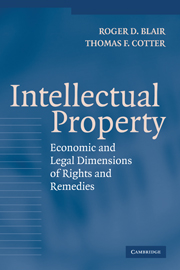Book contents
- Frontmatter
- Contents
- Acknowledgments
- 1 Introduction
- 2 The Law and Economics of IPRs
- 3 A General Theory of Damages Rules
- 4 Departures from the General Theory
- 5 Liability Standards for IPRs
- 6 Who Is an Infringer?
- 7 Who Should Be Entitled to Sue for Infringement?
- 8 Calculating Monetary Damages
- 9 Concluding Remarks
- Bibliography
- Index
5 - Liability Standards for IPRs
Published online by Cambridge University Press: 08 January 2010
- Frontmatter
- Contents
- Acknowledgments
- 1 Introduction
- 2 The Law and Economics of IPRs
- 3 A General Theory of Damages Rules
- 4 Departures from the General Theory
- 5 Liability Standards for IPRs
- 6 Who Is an Infringer?
- 7 Who Should Be Entitled to Sue for Infringement?
- 8 Calculating Monetary Damages
- 9 Concluding Remarks
- Bibliography
- Index
Summary
In this chapter, we take up the related issues of mental states and standards of liability in intellectual property law. For example, should liability depend upon proof of a proscribed act (such as reproduction) regardless of mental state (strict liability), or should it turn upon proof of intent, or negligence, or something else? Courts and commentators sometimes refer to infringement as a strict liability tort, but we will show that this description is not entirely accurate. Before stating our basic conclusions and proceeding with our analysis, however, it may be useful to explain how the issues we discuss in this chapter relate to the other topics in this book, which for the most part concern remedies and procedure.
As we stated in the introduction, our purpose in this book is not to prescribe the optimal design of substantive intellectual property law. That is, whether the incentive structure embedded in the patent laws, the UTSA, the copyright laws, or the Lanham Act is too generous to IPR owners, or not generous enough, or should admit more or fewer exceptions, is not our concern here. We take as our starting point the premise that the substantive laws embody some optimal tradeoff that, if properly applied and enforced, maximizes the surplus of social benefits over social costs. The question then becomes how to ensure proper application and enforcement so that infringers do not undermine the incentive structure.
- Type
- Chapter
- Information
- Intellectual PropertyEconomic and Legal Dimensions of Rights and Remedies, pp. 96 - 131Publisher: Cambridge University PressPrint publication year: 2005



